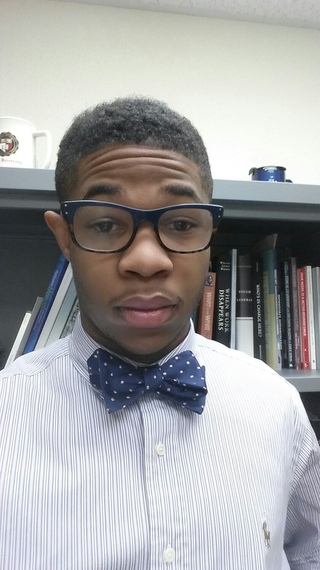Considered a free agent in the world of academia, award-winning McNair Scholar Juwan Z. Bennett prepares for the signing of a lifetime.
"How does it feel to be a black man with options?" is a frequent question posed to one of Philly's hottest free agents by his associates at Yale, Northwestern and Columbia University. A familiar name published by Techbook Online, award-winning McNair Scholar Juwan Z. Bennett, 20, is studying eight hours a day and working on two research projects and now has to decide which of the country's top Ph.D. programs to attend.
"It's really just mind-blowing," he says, alerting me that receiving acceptance letters from Temple, Northwestern and Delaware University has changed how he perceives himself. "I'm humbled. I'm no longer doubting myself as genius!"
With humility coating each word, Bennett, who's currently working with an esteemed educator at Temple University to examine how the YouthBuild model helps black boys navigate the world of academia, says he's ready to own up to his gift and understands that being a genius doesn't mean being the smartest person in the world but "being one of the most innovative." With his core competency rooted in research, coupled with his strong neighborhood ties and access to larger communities through Techbook Online, the South Philly native is aiming to harness the spirit of innovation to change the world through participatory action research (PAR).
Participatory action research (PAR) seeks to understand the world by trying to change it, collaboratively and reflectively. An alternative to positivism in science, this long-standing tradition emphasizes principles of collective inquiry and experimentation grounded in experience and social history. Within a PAR process, "communities of inquiry and action evolve and address questions and issues that are significant for those who participate as co-researchers" (Reason and Bradbury, 2008, p. 1).
With a bachelor's degree in criminal justice and sociology from Temple University, Bennett, who won both the prestigious Diamond and Criminal Justice Faculty Award from his Alma Mater, is planning to rewrite the script of criminal justice in America by talking to the real experts, those who go through the system:
The most successful companies listen to their customers and develop new products or services based on real-time feedback. Customers usually have better insight on how to improve upon existing products because, after all, they're the user. When we start looking at lay people as the experts and valuing their opinions, that's when real change is made.
Bennett is getting to see change happen in real time by working with another one of his research partners, Brian Starks, Ph.D., from Delaware State University, studying how race, gender and class affect bail outcomes in Atlanta and Philadelphia:
We always talk to lawyers and courtroom professionals, but we never interview those who went through the process themselves; we rarely conduct first-person research on this topic. You can't be objective unless you're actually researching the people who are affected. So right now the questions we're asking everyday people are: Why do black males get a higher bail? What kind of crime should get high bails? How does bias in the criminal justice system affect the community?
Bennett notices that people are becoming better informed, and he proclaims with glee, "It works in our favor! People are starting to see some real truths."
He says that in a knowledge-based economy, community voices will be more valuable than ever before, and through his work, those voices will echo in the ivory towers:
Instead of saying we as academics know everything there is to know about bail outcomes, we can hire communities to become our research assistants. That way the solutions and innovation comes from the bottom up as well as the top down. The skills I'm learning now are preparing me to perform effective research, research that's never been done before. No real research has been done from the perspectives of everyday people.
A do-gooder at heart, Bennett says he loves people and wants them to realize their full potential. He's aware that the two projects currently under his belt are going to provide him with the best tools to do it.
When asked if he's ready for the signing of a lifetime and whether he knew he would be leading this historic social-change movement, the always-humble, classically trained musician replied, "I didn't pick the movement; the movement picked me. I just happen to be a willing and ready vessel."
Thanks for reading. Until next time, I'm Flood the Drummer®, and I'm drumming for justice!™
Click here to pledge to see the good in black men and to share their stories so that others may do the same.
